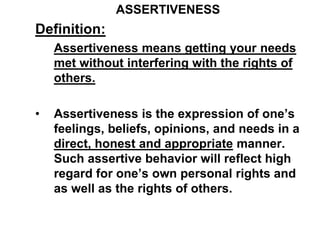
Assertiveness[1].pptx
- 1. ASSERTIVENESS Definition: Assertiveness means getting your needs met without interfering with the rights of others. • Assertiveness is the expression of one’s feelings, beliefs, opinions, and needs in a direct, honest and appropriate manner. Such assertive behavior will reflect high regard for one’s own personal rights and as well as the rights of others.
- 2. • This involves recognizing that in any situation: -You have needs to be met; -The other person or persons have needs to be met; -You have rights; -The other person or persons have rights; • The aim is to satisfy the needs and rights of both parties.
- 3. Why Assertiveness? • Helps you become self-confident • Increases self-esteem • Gain respect of others • Improve communication skills • Improve decision-making ability
- 4. How to be assertive • Be honest and direct about your feelings, needs, beliefs. • Express yourself firmly and directly to specific individuals. • Be reasonable in your requests • State your viewpoint without being hesitant or apologetic. • Be honest when giving or receiving feedback. • Learn to say “no” to unreasonable expectations. • Paraphrase what others have stated to you.
- 5. • Recognize and respect the rights of those around you. • Use appropriate tone of voice. • Be aware of body posture/language • Maintain eye contact. • Use “I” statements to express self • Don’t let others impose their values/ideas on you • Encourage others to be clear and direct • Take ownership
- 6. • Here are some examples of the different ways of behaving: - aggressive, - submissive, and - assertive. • The examples are both verbal and non- verbal – ways of speaking and ways of behaving.
- 7. Way of speaking a) Aggressive: • Demanding • Blaming • Threatening • Giving orders inappropriately • Interrupting • Attacking/Violent • Putting others down • Forcing others to do things • Expressing opinions as facts • Making assumptions • Using ridicule/disrespect
- 8. b) Submissive: • Saying ‘I’m sorry’ often • Saying ‘I’m afraid’ often • Not getting to the point • Saying ‘I should/must/ought’ often • Putting yourself down • Not saying what you want/feel/like • Agreeing to things you do not want to do to keep the peace • Complaining behind the scenes
- 9. c) Assertive: • Stating clearly what you want/need/feel • Making brief statements that are to the point • Saying ‘no’ when you want to • Giving praise or constructive criticism when necessary • Finding out the wants/needs/feelings of others • Making decisions • Standing up for yourself • Acknowledging the other person’s standpoint
- 10. Ten good reasons to be assertive • You will feel happier because you will have expressed your needs • It is more likely that your needs will be met because people will know what they are. • Even if your needs are not met, you will feel better knowing that you handled the situation well and you will have nothing to blame yourself for. • Your confidence will increase because there will be no situation you will be threatened by
- 11. • You will build a better team because you will be able to use everyone’s strengths instead of being threatened by them. • You will be able to control your own behavior and therefore be more effective in negotiating clear and workable agreements. • You will take more initiatives because you will not be as afraid of making mistakes as you used to be. • You will reduce your stress level because negative feeling of anger and frustration will not be allowed to build up. • You will communicate better with people because if you are more direct with others, they are more likely to be direct with you. • You will be more comfortable to be around, and thus your relationships with others will improve at all levels.
- 12. Rights at work • To know what is expected of me • To have regular feedback on my performance • To be consulted about decisions that affect me. • To take decisions that are within my area of work • To refuse unreasonable requests. • To expect work of a certain standard from my staff • To criticize constructively the performance of my staff when appropriate